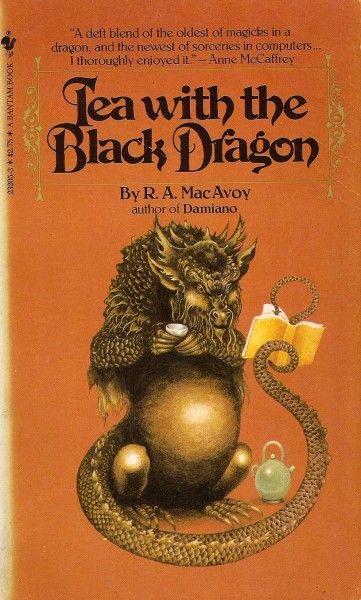Same river, different shore
Tea with the Black Dragon
By R A MacAvoy

14 Oct, 2014
0 comments
I was just having a conversation about how context affects my reading of a book. I loved Tea With a Black Dragon back in 1983. The copy I read is the same copy I read in 1983 but my experience reading it was very different.
But first! A positive note: thank you to all the authors back in August 1983 – February 1984 who kept your mass market paperbacks slender enough to fit into the inside breast pocket of a Burns Security uniform without leaving a tell-tale bulge on the uniform. Although oddly the pocket seemed to have been designed to facilitate that, which makes me wonder what the designer envisioned would be carried in that pocket. A notebook? But that went into my trouser pocket…
It’s the early 1980s, cell phones look like this

and 16K is still a respectable amount of memory for a computer. Martha Macnamara1, former orchestral violinist turned zen master and Celtic fiddler, is in San Francisco looking for her daughter Liz. Liz seems to have vanished, something made even more ominous by the fact that before she vanished Liz had asked for her mother’s help with a crisis whose nature was not divulged.
The ever so mysterious Mayland Long happens to be staying in the same hotel as Martha. After he becomes convinced she is the great zen master he has been searching for, they form an alliance. This is very good for Martha because the people Liz has gotten tangled up with are very bad people indeed and having someone with superhuman gifts on Martha’s side may well save both Martha and Liz’s lives and somewhat less good for Mayland since his abilities don’t include being bullet-proof.
It turns out Liz is hiding from former confederates in crime, having used her programming skills in service of badness. By the time Mayland tracks Liz down using conventional legwork, the black hats decide Martha is too much of a threat and Martha vanishes. The plot suddenly switches from the search for Liz to the search for Martha, with no guarantee that the hot-headed bad guys won’t simply have murdered her.
There’s a trope that I used to call “what these people need is a honky” and what TV Tropes calls “mighty whitey”:
A common trope in 18th and 19th century adventure fiction, when vast swathes of the world were being explored and properly documented by Europeans for the first time, Mighty Whitey is usually a displaced white European, of noble descent, who ends up living with native tribespeople and not only learns their ways but also becomes their greatest warrior/leader/representative.
This isn’t quite that because Mayland has to travel to the US to find his fabled zen master in the form of a nice white lady but this book can see Mighty Whitey from where it is standing. It’s not the worst ‘a white woman turns out to be better at everything that matters to a supernatural Chinese being’ book that I have read2 but sadly it’s hard to read that part of the book as sympathetically as I did in 1983, particularly since some of MacAvoy’s vocabulary choices are … quaint.
The subplot about Fred, the dogged nice guy in love with Liz, has also not aged well. Again, the text is the same but the context has changed. I don’t think Fred does what he does expecting or even hoping that Liz will fall for him but since towards the end of the book Liz seems to be taken with Fred – or at least Fred’s mustache – a Nice Guy read Fred’s subplot as showing Nice Guyery can work.
I will say it was nice to be reminded of a time when Celtic themes in fantasy had not been overused to the point that they trigger acute aversion in me. Martha seems nice enough, and while her daughter is pretty consistently a bad judge of character, that’s characterization and not a bug. Anyway the plot won’t go if Liz isn’t as much of a sap as she is.
There’s a secondary issue in this book that since the issue is Liz’s confederates in crime, there’s no way to bring the cops in without Liz facing a good chance of being charged herself but without getting the cops involved, a legal resolution of the conflict is impossible. A lot of books, an ally of the protagonist would get a pass on their own criminal behavior3. I am happy to say this book doesn’t try to give Liz an easy out on that.
At 166 pages, the book does not overstay its welcome and I think many readers unburdened with my particular issues might like this more than I do at this time. It’s still an often charming period piece, just not as charming to me as it was in 1983. Tea with the Black Dragon is available as an ebook from Open Road Media.
- Macnamara is consistently spelled with a lower case N.
- That would be Kylie Chan’s Dark Heavens series, where tutor Emma Donahoe turns out to have awesome Chi powers, a knack for kung fu, is appealing enough to make a widower god go all swoony and in later books seems to be better at the god thing than the actual gods.
- Not to mention how many books center on the protagonist committing a string of felonies to clear themselves of the one felony they did not commit.
